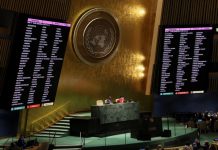Pakistan opposes the creation of new permanent members in the United Nations Secrutiy Council (UNSC) by ignoring Inter Governmental Negotiations (IGN). India, Brazil, Germany, and Japan are trying to add new members without going through the IGN process.
“The Inter-Governmental Negotiations (IGN) remains the only credible platform for a comprehensive reform of the Security Council,” Ambassador Munir Akram, Permanent Representative of Pakistan to the United Nations said, as the long-running IGN process resumed in New York on Monday. He re-affirmed Pakistan’s strong opposition to creating new permanent members. “Any attempts to undermine or derail the IGN process will prove counterproductive.”
The Pakistani envoy said that G-4 members have failed to get support for their bid for permanent membership of the Council, and now they are trying to create the ‘fear’ that the opportunity for reform may be lost unless their described processes were not endorsed.
“We are prepared to breathe new life in the IGN but some states are bent upon killing the process,” Ambassador Akram said.
Full-scale negotiations to reform the Security Council began in the General Assembly in February 2009, but member states remained conflicted over the process of instating new members in the UNSC.
The G-4 group is demanding additional 10 seats in the UNSC, with six permnanent and four non-permanent members. Italy and Pakistan, leading a group called Uniting for Consensus (UfC), opposed any additions, claiming it would make the Council less representative, less effective and more divided. They said any additions would diminish the right of the vast majority of the UN membership to serve on the Council. The UfC group has proposed expanding non-members with longer duration in terms and a possibility to get re-elected. It also proposed that the UNSC may have 11 new non-permanent seats to accommodate the interest of all groups.
The Security Council is currently composed of five permanent members—Britain, China, France, Russia and the United States—and 10 non-permanent members elected to serve for two years. In 1945, the Council represented 20% of the membership of the United Nations, while today, it represents 8% of the membership. In 1945, there was one non-permanent seat for 8 member states, yet today there is one non-permanent seat for 19 member states.









